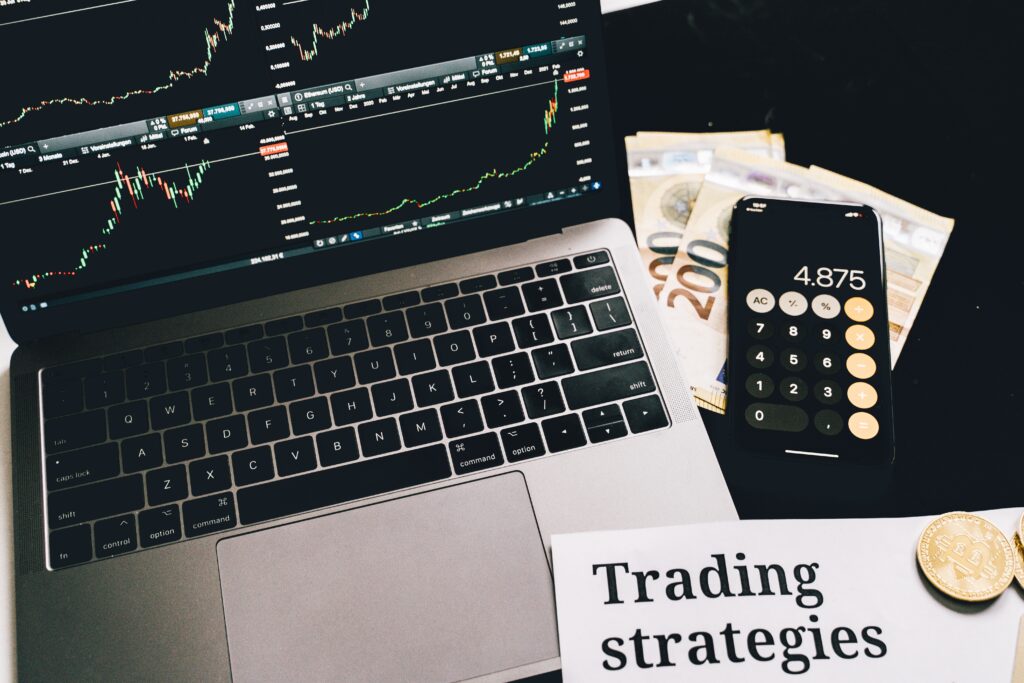Exchanging cryptocurrency have been very famous as of late, drawing those keen on finding out about the universe of computerized resources and perhaps bringing in cash. Be that as it may, going into Bitcoin and exchanging indiscriminately without a strategy may be hazardous. The article will go through the essential standards of cryptocurrency money exchange as well as certain procedures that fledglings can apply to work on their odds of coming out on top.
Introduction to Cryptocurrency Trading
Trading digital currencies for a benefit incorporates buying, making them available for purchase, and trading them. Cryptocurrency works on decentralized networks, rather than conventional monetary business sectors, empowering clients to go through with shared exchanges liberated from the impact of delegates.
Understanding the Basics of Cryptocurrencies
What is cryptocurrency?
Cryptography is used for security in the digital or virtual currency known as cryptocurrency. It uses blockchain technology, which guarantees decentralization, transparency, and immutability. In 2009, Satoshi Nakamoto, an obscure individual or association, delivered the main cryptographic money, called Bitcoin. Various digital forms of money have since emerged, each with unmistakable highlights and applications.
How does cryptocurrency trading work?
Cryptocurrency trading includes estimating the value developments of advanced resources. Brokers can purchase digital forms of money with the assumption that their worth will increment over the long run, permitting them to sell at a more exorbitant cost and create a gain. On the other hand, brokers can likewise short-sell cryptographic forms of money, expecting to benefit from a cost decline by selling acquired resources and repurchasing them at a lower cost.
Choosing the Right Cryptocurrency Exchange
Selecting a reliable and user-friendly cryptocurrency exchange is crucial for beginners. Consider the following factors when choosing an exchange:
Factors to consider when selecting an exchange
- Security measures and protocols
- User interface and ease of use
- Available cryptocurrencies and trading pairs
- Liquidity and trading volume
- Fees and transaction costs
- Customer support and reputation
Popular cryptocurrency exchanges for beginners
- Coinbase
- Binance
- Kraken
- Gemini
- Bitstamp
These exchanges have user-friendly interfaces, robust security features, and a wide range of supported cryptocurrencies, making them ideal choices for beginners.
Developing a Trading Plan
Prior to plunging into cryptocurrency trading, it’s fundamental to foster a thorough exchange plan. This plan will act as a guide, directing your venture choices and limiting the effect of feelings on your exchanging exercises. Consider the accompanying advances while making an exchange plan:
Setting financial goals
Obviously, characterize your monetary objectives and assumptions from cryptocurrency trading. Conclude how much income you’re willing to gamble with money management and how much gamble you’re alright with.
Determining risk tolerance
Evaluate your gamble resistance to decide the degree of chance you will attempt. Digital money markets are exceptionally unpredictable, and costs can vary quickly. Understanding your gamble resilience will assist you with pursuing informed choices and keeping away from rash activities.
Creating a trading strategy
Foster an exchanging technique in light of your objectives, risk resistance, and market examination. Consider the time span of your exchanges (present moment or long haul) and the markers and instruments you will use to recognize likely sections and leave focuses.
Technical Analysis for Cryptocurrency Trading
Specialized investigation includes examining authentic cost and volume information to gauge future cost developments. It assists brokers with recognizing examples, patterns, and expected inversions on the lookout. Find out about the accompanying key ideas and devices of specialized investigation:
Key concepts of technical analysis
- Support and resistance levels
- Trend lines and channels
- Candlestick patterns
- Moving averages
- Relative Strength Index (RSI)
- Moving Average Convergence Divergence (MACD)
Common technical indicators
- Bollinger Bands
- Fibonacci retracement levels
- Stochastic Oscillator
- Volume indicators
Reading and interpreting charts
Charts are essential tools for technical analysis. Learn to read and interpret different types of charts, such as line charts, bar charts, and candlestick charts. Identify patterns and use technical indicators to make informed trading decisions.
Fundamental Analysis for Cryptocurrency Trading
Aside from specialized examination, major investigation is likewise essential for assessing the capability of cryptocurrency. The major investigation centers around evaluating the fundamental undertaking and group behind a cryptocurrency to decide its natural worth and future possibilities. Consider the accompanying perspectives while directing a major investigation:
Importance of fundamental analysis
The central examination assists financial backers with checking the drawn-out feasibility and development capability of cryptographic money. It includes investigating the venture’s whitepaper, improvement group, associations, reception rates, and market interest.
Evaluating the project and team behind a cryptocurrency
Evaluate the task’s objectives, innovation, use case, and market seriousness. Look at the certifications and experience of the improvement group and their history in the business.
Monitoring news and market trends
Remain refreshed with the most recent news and improvements in the cryptocurrency market. Buy into trustworthy digital money news stages and follow powerful figures in the business. Market patterns and news can essentially affect digital money costs.
Risk Management in Cryptocurrency Trading
Overseeing chances is fundamental to safeguard your capital and forestall significant misfortunes. Execute the accompanying gamble on the executive’s systems in your digital money-exchanging exercises:
Setting stop-loss orders
A stop-misfortune request is a programmed guidance to sell digital money when it arrives at a particular cost. It helps limit expected misfortunes by guaranteeing that a foreordained leave point is executed in the event that the market moves against your situation.
Diversifying your portfolio
Expansion includes spreading your speculations across various digital currencies to lessen risk openness. By enhancing, you can alleviate misfortunes assuming one digital money fails to meet expectations while possibly profiting from the outcome of others.
Avoiding emotional decision-making
Feelings can cloud judgment and lead to imprudent exchanging choices. Foster discipline and adhere to your exchange plan. Try not to settle on hurried choices in light of dread or ravenousness.
Popular Cryptocurrency Trading Strategies
There are different exchange procedures utilized by digital money merchants, each taking special care of various exchanging styles and chance hungers. A few famous procedures include:
Buy and hold strategy
The purchase-and-hold methodology includes buying crypto and clutching them for a drawn-out period, ordinarily with the assumption of long-haul cost appreciation.
Day trading strategy
Day exchanging includes executing numerous exchanges inside a solitary day. Informal investors exploit transient value changes and plan to benefit from intraday unpredictability.
Swing trading strategy
Swing dealers stand firm on footholds for a couple of days to weeks, exploiting medium-term cost swings. They expect to catch momentary patterns and benefit from cost inversions.
Scalping strategy
Scalping is a high-recurrence exchanging procedure that plans to benefit from little cost changes. Hawkers enter and leave exchanges inside the space of minutes or seconds, depending on liquidity and tight bid-ask spreads.
Common Mistakes to Avoid in Cryptocurrency Trading
Beginner traders often make certain mistakes that can hinder their progress and result in financial losses. Avoid the following common pitfalls:
FOMO (Fear of Missing Out)
FOMO can prompt indiscreet purchasing choices in light of the feeling of dread toward passing up likely benefits. It’s pivotal to lead intensive exploration and pursue informed speculation choices as opposed to capitulating to FOMO.
Overtrading
Overtrading happens when brokers exorbitantly participate in trading exercises, driven by the craving to benefit from each market development. Overtrading can prompt depletion, close-to-home pressure, and expanded exchange costs.
Ignoring risk management
Ignoring risk-the-board practices can open merchants to critical misfortunes. Continuously set stop-misfortune orders, differentiate your portfolio, and apportion a proper piece of your money to each exchange.
Falling for scams and fraudulent projects
The cryptographic money market is vulnerable to tricks and deceitful ventures. Practice watchfulness and lead a reasonable level of effort prior to putting resources into digital money. Research the undertaking, group, and local area to guarantee genuineness and validity.
Resources for Learning and Improving Cryptocurrency Trading Skills
Continuous learning is crucial for improving your cryptocurrency trading skills. Take advantage of the following resources:
Online courses and tutorials
Various internet-based stages offer digital currency exchange courses and instructional exercises. Udemy, Coursera, and Investopedia give thorough instructive materials appropriate to fledglings.
Books and publications
Books, for example, “Digital Currency: How Bitcoin and Advanced Cash are Testing the Worldwide Financial Request” by Paul Vigna and Michael J. Casey, and “Exchanging Digital Forms of Money: A Novice’s Aide” by Clem Chambers can give important bits of knowledge and techniques.
Trading communities and forums
Join online networks and discussions where brokers share information, encounters, and exchange systems. Reddit’s r/Cryptographic money and Bitcointalk.org are well-known stages for drawing in with the digital currency local area.
Staying Informed and Adapting to Market Changes
The advanced currency market is dynamic and consistently creating. Stay informed and acclimate to feature changes to help your trading accomplishment. Ponder the going with:
Following reputable sources of information
Follow dependable digital currency news stages, like CoinDesk, Cointelegraph, and CoinMarketCap, to remain refreshed on market patterns, administrative turns of events, and mechanical headways.
Keeping up with industry developments
Take part in industry meetings, online courses, and classes to acquire bits of knowledge from industry specialists. Remain refreshed on new digital currency undertakings, organizations, and administrative changes that can influence the market.
Adapting strategies as the market evolves
The cryptographic money market is exceptionally unstable and dependent upon fast changes. Consistently survey and adjust your exchanging methodologies in light of economic situations and advancing patterns.
Conclusion
Digital money exchange can be a rewarding undertaking for fledglings, furnished they approach it with the right information and methodologies. By figuring out the essentials of cryptographic forms of money, picking a solid trade, fostering an exchange plan, using specialized and key examination, overseeing gambles, and remaining informed, novices can upgrade their odds of coming out on top in this thrilling and dynamic market.



